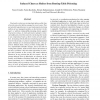Free Online Productivity Tools
i2Speak
i2Symbol
i2OCR
iTex2Img
iWeb2Print
iWeb2Shot
i2Type
iPdf2Split
iPdf2Merge
i2Bopomofo
i2Arabic
i2Style
i2Image
i2PDF
iLatex2Rtf
Sci2ools
NDSS
2006
IEEE
2006
IEEE
Induced Churn as Shelter from Routing-Table Poisoning
Structured overlays are an important and powerful class of overlay networks that has emerged in recent years. They are typically targeted at peer-to-peer deployments involving millions of user-managed machines on the Internet. In this paper we address routing-table poisoning attacks against structured overlays, in which adversaries attempt to intercept traffic and control the system by convincing other nodes to use compromised nodes as their overlay network neighbors. In keeping with the fully-decentralized goals of structured overlay design, we propose a defense mechanism that makes minimal use of centralized infrastructure. Our approach, induced churn, utilizes periodic routing-table resets, unpredictable identifier changes, and a rate limit on routing-table updates. Induced churn leaves adversaries at the mercy of chance: they have little opportunity to strategize their positions in the overlay, and cannot entrench themselves in any position that they do acquire. We implement ind...
| Added | 12 Jun 2010 |
| Updated | 12 Jun 2010 |
| Type | Conference |
| Year | 2006 |
| Where | NDSS |
| Authors | Tyson Condie, Varun Kacholia, Sriram Sank, Joseph M. Hellerstein, Petros Maniatis |
Comments (0)

